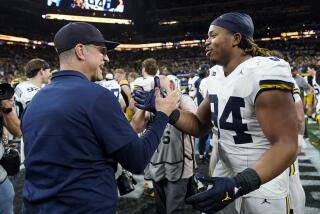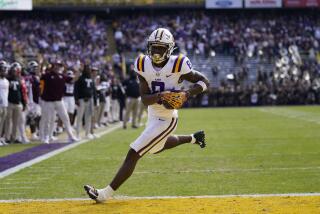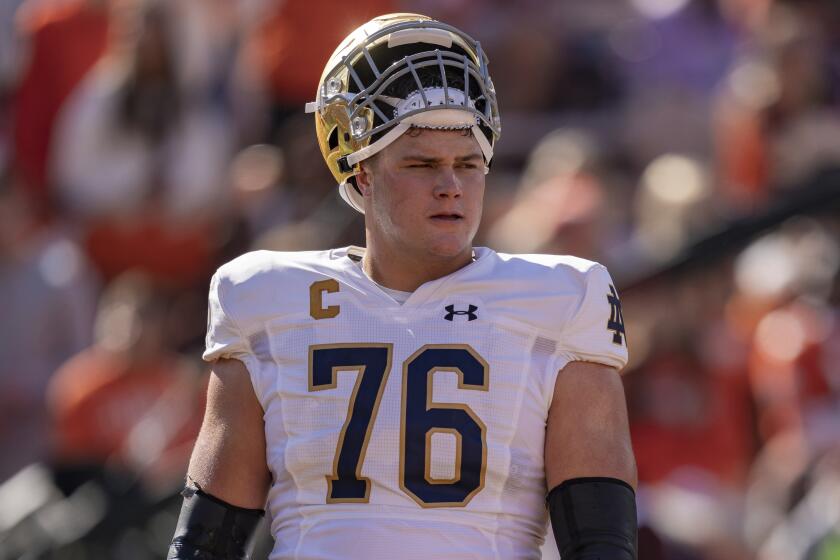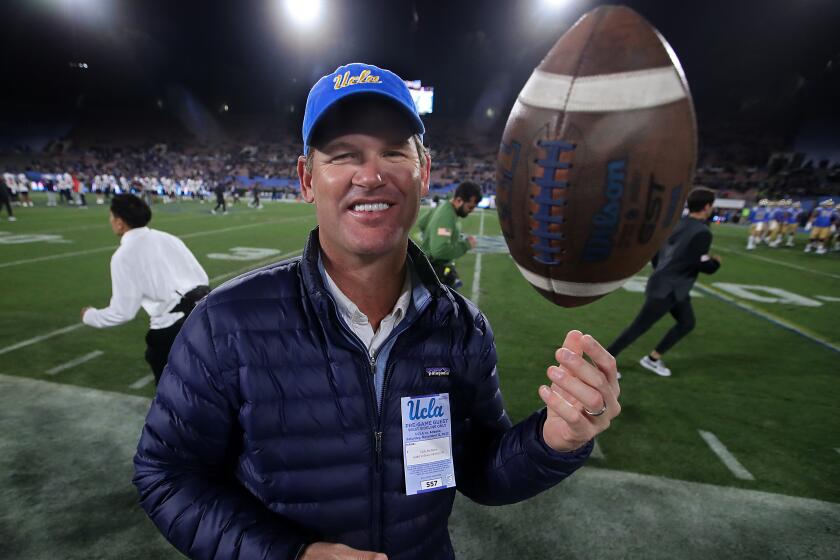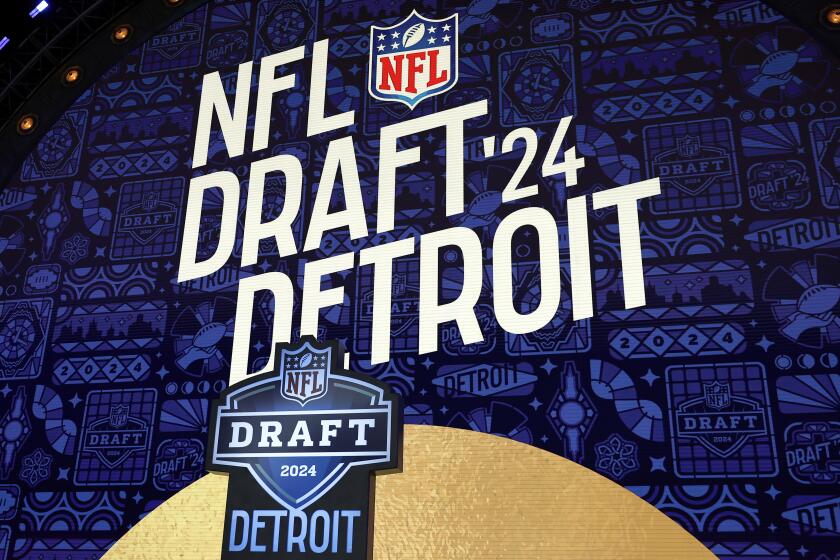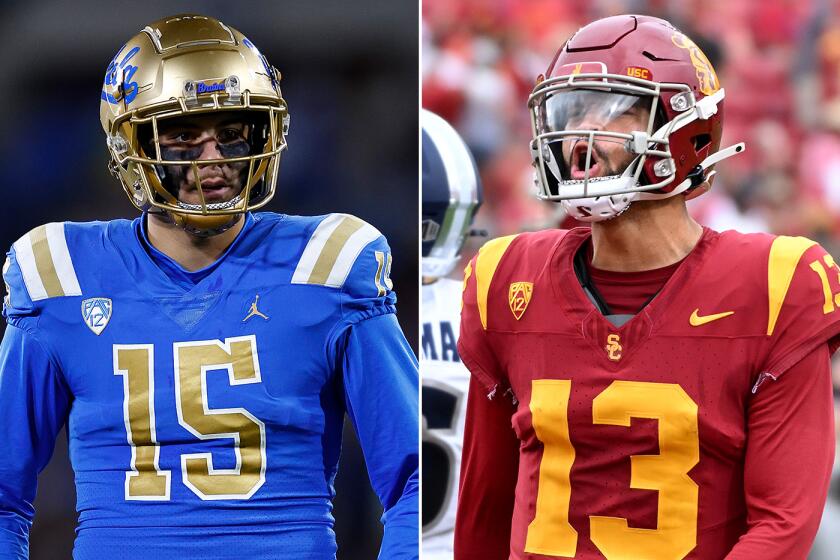Chargers break down where they improved most in the NFL draft and why they didn’t draft a quarterback
Justin Jones was soaping his 309-pound body when his phone rang. He probably shouldn’t have been in the shower during the NFL draft, but he had just bowled four straight games with his girlfriend and she thought he was smelling a little ripe.
Plus he wasn’t thinking Friday would be his night — the family draft party was scheduled for the next day.
When the Chargers called to select the North Carolina State defensive tackle in the third round, he was caught off guard, his fingers too wet to operate the iPhone screen.
Luckily he was able to get to a towel and answer the phone, beginning his pro football career without pants.
“Everybody started going crazy,” Jones said.
When it comes, it doesn’t matter how that call gets there — or really when.
In the final three rounds of the draft, whether your mother is running across the lawn with the house phone as Dylan Cantrell’s did, or whether you’re staring at your phone until the final picks of Round 7 as Northwestern running back Justin Jackson was, all that matters is that the call comes.
“In my eyes, we’re all on an equal playing field and equal level,” said Jackson, whom the Chargers made the 251st out of 257 picks. “You go in there and compete. That’s what I’m looking forward to doing. As of right now, I don’t care where I was drafted. I’m just glad that I was drafted.
“…I’m so ready. If I could get on a plane right now and go to L.A. and get started, I would do that.”
For Chargers general manager Tom Telesco, these calls have been routine. But he realized how much more it means to the players.
“For us, we do it every year; it’s just part of our process of how we’re picking the player. I just had never thought about the other end of the phone,” Telesco said. “But it’s pretty neat that that player finally realizes his dream to become a professional football player.”
These are important calls, just as each decision is an important call for the Chargers. Saturday they rounded out their draft with four picks — one defensive player before three straight offensive selections.
In the fourth round they took West Virginia safety Kyzir White, whom the team will convert to outside linebacker. In the fifth they took UCLA guard/center Scott Quessenberry, who grew up cheering for the San Diego Chargers. In the sixth they took Cantrell, a big wideout from Texas Tech, before capping the three-day draft with Jackson.
“Really excited about the draft class,” coach Anthony Lynn said. “I thought we got good individuals. They all have great personalities, backgrounds, good intangibles. But they’re good football players as well. We like what they bring to our locker room and on the field.”
White was the fourth straight defensive player Telesco selected in this draft. The brother of NFL receiver Kevin White, Kyzir never has been a full-time linebacker but says “I can adjust to anything.”
Telesco said the strong-safety-to-outside-linebacker conversion is fairly common.
“You’re looking at the size and speed. First start there,” Telesco said. “So Kyzir has some length to him. Long arms, tall, over 6-1, and he can really run, which you’ve got to have that. … But in the end, I guess to add on to that, he loves to hit. He’s a physical player. So you add those together.”
He fit the Chargers’ theme in the early rounds of trying to get faster and add physicality to their defense, something that began in Round 1 when Florida State safety Derwin James slid back to the No. 17 pick.
Linebacker Uchenna Nwosu from USC, Jones and White should all be impact players early on, at least on special teams.
“We’re looking to upgrade our speed — size and speed. I think that’s what we did on defense,” Lynn said. “I feel better about some of the matchups now, with those guys roaming around on the field.”
Quessenberry, who started 44 games for the Bruins, will provide depth at guard and center and can learn behind newly signed center Mike Pouncey, one of his favorite players.
Cantrell should compete for the final wide receiver spot with Geremy Davis, and Jackson has a golden opportunity to earn carries with only Melvin Gordon and Austin Ekeler currently in the backfield.
“The draft room, for the seventh round, was pretty excited that Justin was there and we had a chance to draft him,” Telesco said. “He’s got a great opportunity with the way the roster is right now.”
One call the Chargers didn’t make in the draft was to a quarterback, as they continue to formulate a succession plan for their 36-year-old starter, Philip Rivers.
After a productive 2017 for Rivers, the Chargers weren’t in a rush to draft a young quarterback, waiting until after the final round to sign Texas Tech’s Nic Shimonek as an undrafted free agent. He’ll join Rivers, Geno Smith and Cardale Jones heading into training camp.
“Number one, we feel good about the quarterback room. And then No. 2, it has to be the right player at the right time at the right place,” Telesco explained. “So that’s just how it played out.”
With all the picks made, it’s the pundits’ turn to make their call, assigning a grade to the 72-hour culmination of a year’s worth of film breakdown, in-person scouting and interviews.
But whether they scored an “A” or an “F”, Telesco said it doesn’t matter at this point.
“Honestly, we look back at our win-loss record,” he said.
And if the Chargers made seven correct calls, theirs will be better.
Free-agent signings
Last season the team found a major contributor after the draft, signing Ekeler out of Western State as an undrafted free agent.
In the hours after the final pick, the Chargers began to build this year’s undrafted class with Shimonek and Alabama cornerback Tony Brown among the biggest names.
In addition, the Chargers agreed to terms with William & Mary offensive tackle Chris Durant, Georgia State cornerback B.J. Clay, Minnesota defensive tackle Steven Richardson, Kansas tight end Ben Johnson, Grambling guard Trent Scott, Texas Christian tight end Cole Hunt, Oklahoma State offensive tackle Zach Crabtree, Arkansas defensive tackle Bijhon Jackson, Western Carolina running back Detrez Newsome, Clemson cornerback Marcus Edmond, Virginia Tech cornerback Brandon Facyson, Colorado State linebacker Zack Golditch, Eastern Washington defensive end Albert Havili, Houston linebacker D’Juan Hines, West Georgia wide receiver JJ Jones, Nichols State defensive lineman Tevin Lawson, Albany fullback/tight end Anthony Manzo-Lewis, McNeese State wide receiver Kent Shelby and Texas A&M punter Shane Tripucka.
Twitter: @DanWoikeSports
More to Read
Go beyond the scoreboard
Get the latest on L.A.'s teams in the daily Sports Report newsletter.
You may occasionally receive promotional content from the Los Angeles Times.

